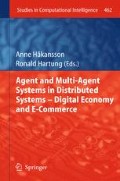Abstract
This chapter presents a forward looking view of the transition to extremely rapid business operations. The argument for this future is based on the trajectory of business operations. It is not certain, but does show an interesting future view for systems the IT professionals will have to build and manage.
Access this chapter
Tax calculation will be finalised at checkout
Purchases are for personal use only
Preview
Unable to display preview. Download preview PDF.
References
Lau, R.Y.K.: Adaptive Negotiation Agents for E-business. In: ICEC 2005 (2005)
Li, H., Su, S.Y.W., Lam, H.: On Automated e-Business Negotiations: Goal, Policy, Strategy and Plans of Decision and Action. Journal of Organizational Computing and Electronic Commerce 13(1), 1–29 (2006)
The Open Group, The Open Group Architectural framework (TOGAF) version 9. The Open Group, Reading, UK (2009), http://www.opengroup.org/togaf/
The Kurzweil Accelerating Intelligence newsletter, http://www.kurzweilai.net/in-denmark-a-printable-house?utm_source=KurzweilAI+Daily+Newsletter&utm_campaign=8179b0de4d-UA-946742-1&utm_medium=email (retrieved on May 7, 2012)
Turkle, S.: The Second Self: Computers and the Human Spirit. The MIT Press (2005) ISBN-13: 978-0262701112n Spirit
Ashraf, J., Cyganiak, R., O’Riain, S., Hadzic, M.: Open eBusiness Ontology Usage: Investigating Community Implementation of Good Relations. In: LDOW 2011, Hyderabad, India, March 29 (2011)
Osterwalder, A., Pigneur, Y.: An e-Business Model Ontology (eBMO) for Modeling eBusiness. In: The Bled EC Conference of the 15 th Bled eCommerce Conference (2002)
Singh, R., Iyer, L., Salam, A.F.: Semantic eBusiness. Int’l Journal on Semantic Web & Information Systems 1(1), 19–35 (2005)
Håkansson, A.: A Multi-Agent System with Negotiation Agents for e-Trading Products and Services. In: König, A., Dengel, A., Hinkelmann, K., Kise, K., Howlett, R.J., Jain, L.C. (eds.) KES 2011, Part IV. LNCS, vol. 6884, pp. 415–424. Springer, Heidelberg (2011)
Author information
Authors and Affiliations
Editor information
Editors and Affiliations
Rights and permissions
Copyright information
© 2013 Springer-Verlag Berlin Heidelberg
About this chapter
Cite this chapter
Hartung, R.L. (2013). Implications and Solution for High-Speed Business Architecture. In: Hakansson, A., Hartung, R. (eds) Agent and Multi-Agent Systems in Distributed Systems - Digital Economy and E-Commerce. Studies in Computational Intelligence, vol 462. Springer, Berlin, Heidelberg. https://doi.org/10.1007/978-3-642-35208-9_7
Download citation
DOI: https://doi.org/10.1007/978-3-642-35208-9_7
Publisher Name: Springer, Berlin, Heidelberg
Print ISBN: 978-3-642-35207-2
Online ISBN: 978-3-642-35208-9
eBook Packages: EngineeringEngineering (R0)

